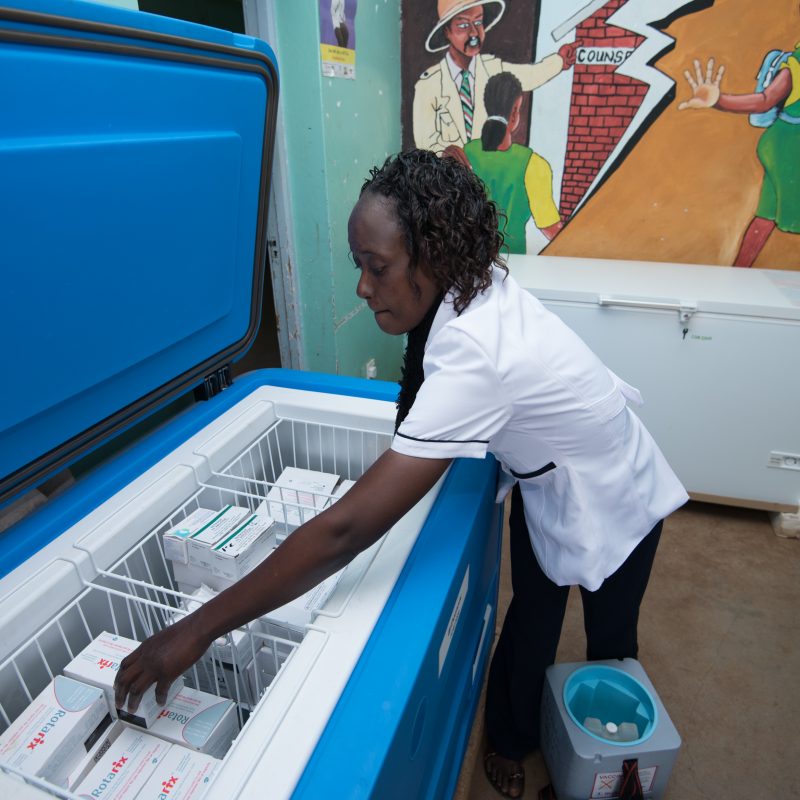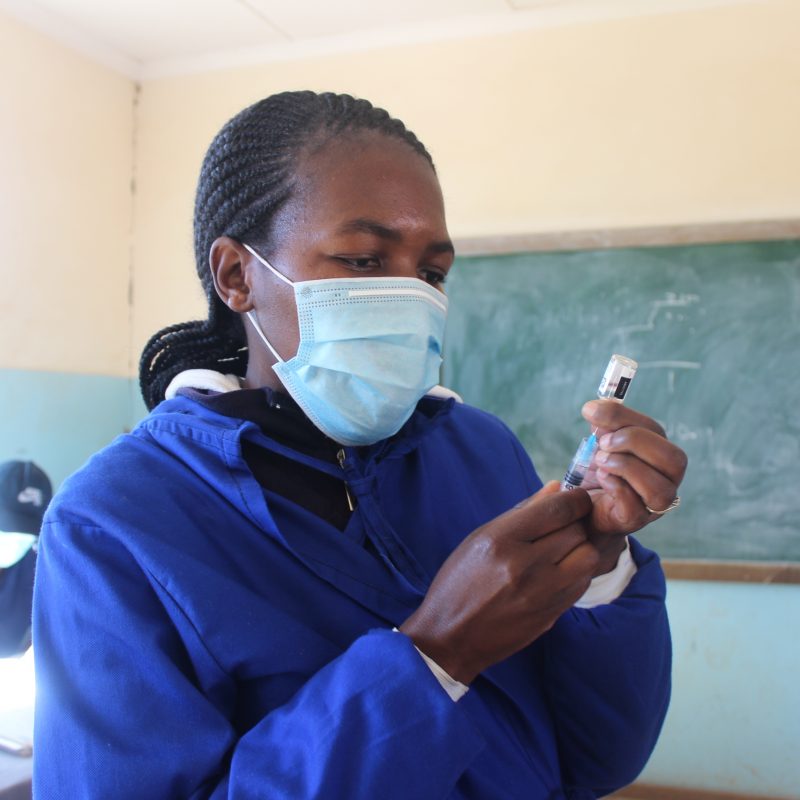A key component of quality health care
For more than two decades, Jhpiego has supported global and country immunization programs. Jhpiego prioritizes vaccination throughout a person’s life, integrated approaches, equal access for all, and innovations in vaccine devices and programs. Our expertise in immunization is grounded in our more than 50 years of developing the health workforce, improving health service delivery, and contributing to global health policy.

Our immunization work has been integral to our history of leadership in maternal and child health programs. We have demonstrated how immunization can be integrated with other health services—for example, providing postnatal care, such as family planning services, to new mothers alongside immunization for their babies.
Jhpiego has been actively involved in global and country-level efforts to expand vaccination to adolescents and school-age children, such as the human papilloma virus (HPV) vaccine that prevents cervical cancer, and routine vaccination for mothers and children. We support efforts to reach children who have missed vaccines or who have never received a vaccine (termed “zero-dose” children) and to introduce the new malaria vaccines in high-prevalence countries. As part of our global health security focus, we work to make countries and regions safer; ensuring access to vaccines is critical to preventing and responding to outbreaks.
We Believe
- Wherever a woman and her family live, they should have access to lifesaving health care, including vaccinations.
- Vaccination is a key part of quality primary health care.
- Vaccines aren’t just for children. They should also be available for adolescents, pregnant women, and other adults.
- Vaccines contribute to safer, stronger, more prosperous communities and countries
Working with Partners to Increase Vaccine Readiness, Introduction, and Scale-Up
Jhpiego is a proven leader in building capacity of vaccinators, community health workers, and others supporting vaccination efforts and ensuring quality service delivery at vaccination sites and as part of integrated health services. We also conduct monitoring and surveillance, generate demand, and build community confidence in immunization.
How We Make an Impact
Jhpiego works with ministries of health, multilateral and bilateral donors, Johns Hopkins University colleagues, international and local nongovernmental organizations, and communities to promote vaccine readiness, introduction, and scale-up, including generating demand and building community confidence in immunization.
Globally, we work on primary prevention of cervical cancer through HPV vaccination for adolescent girls. We have and are supporting introduction of HPV vaccines in Côte d’Ivoire, India, Guinea, Liberia, Pakistan, the Philippines, and Zambia.
We also assist with the introduction of new malaria vaccines in high-prevalence countries—to date, we have worked with the ministries of health in Burkina Faso, Côte d’Ivoire, and Liberia—and serve on the World Health Organization’s global malaria vaccine coordination group.
We help prepare the way for new products on the horizon, such as vaccines given late in pregnancy to protect the newborn against respiratory syncytial virus (RSV) and improved vaccines against tuberculosis. We work in Kenya, Bangladesh, India, and elsewhere to understand how existing health services like antenatal care clinics can be best made ready.
New vaccines play a key role in responding to global and regional health emergencies. We supported rollout of the COVID-19 vaccines in more than 15 countries and developed tools to promote vaccination of pregnant women against COVID-19.
Jhpiego is a global leader in work to better understand how immunization can best be combined with other essential health care—an approach termed integrated service delivery. We helped document the potential of immunization clinics in the first year of life to also offer women postpartum family planning.
We research how HPV vaccination of adolescent girls could be linked with other services for youth health and welfare. We test practical solutions in Côte d’Ivoire, Nigeria, and Tanzania, and lead knowledge synthesis in this area for an additional eight countries. In Tanzania, we supported the government’s efforts to provide key adolescent health interventions at the same time as HPV vaccination in both schools and health clinics.
In India and Tanzania, we demonstrated integration of HPV vaccination with youth health services. In these and other countries, Jhpiego uses human-centered design to ensure programs consider the needs of young people.
Jhpiego experts contribute to global advisory groups such as those supporting the World Health Organization and Gavi to examine how vaccines for older adolescents and adults could be made more accessible in low-income settings.
Jhpiego works to enable access among families and communities that immunization programs find hard to reach. This can include new approaches to reach “zero dose” children who have not had the first essential vaccine, or to reach girls who are not in school with HPV vaccine.
Jhpiego supported Burkina Faso, the Democratic Republic of the Congo, Ghana, Liberia, Pakistan, Rwanda, Sierra Leone, and Zambia to develop successful applications for Gavi equity accelerator funding to reach zero-dose and under-vaccinated children. As a partner to the International Centre for Diarrhoeal Disease Research, Bangladesh, we work with the Country Learning Hub that is documenting new ways to reach families who are missing out on immunization.
We worked with the World Health Organization on global guidance to improve measles-rubella vaccine campaigns and supported catch-up efforts for HPV and other vaccines. Through the U.S. Agency for International Development MOMENTUM Private Healthcare Delivery project, we documented good practices in private-sector engagement to boost immunization programs’ reach and sustainability.
We work with technology companies to test new vaccination devices. For example, we researched needle-free jet injectors for polio vaccine in Nigeria and new rapid diagnostics for measles in Zambia.
During the COVID-19 pandemic, Jhpiego harnessed its five decades of experience, expertise, and partnerships to help rapidly introduce and scale COVID-19 vaccination, often linking these efforts to broader prevention and clinical care, such as HIV programs. We collaborated with ministries of health to roll out COVID-19 vaccines in Afghanistan, Burkina Faso, Ecuador, Ghana, Guinea, India, Kenya, Lesotho, Madagascar, Namibia, Nigeria, Pakistan, Rwanda, South Africa, Tanzania, and elsewhere.
We partnered with governments and local organizations to promote vaccine acceptance. For example, in Kenya, we worked with a Kenya-based tech social enterprise that uses artificial intelligence (AI) to tap social media insights for sentiment analysis, identifying key influencers to creatively address vaccine hesitancy in focus communities.
We used machine learning/AI tools and digital platforms to monitor, in real-time, adverse events following immunization, in collaboration with the World Health Organization, and developed planning systems for pharmacovigilance and monitoring adverse events following immunization.
In the United States, Jhpiego worked with the Baltimore City Health Department to implement a COVID-19 vaccine strategy, which included mobile clinics to support vaccine access and acceptance. With support from the Johns Hopkins Bloomberg School of Public Health, Bloomberg Philanthropies, and the Baltimore City Health Department, we developed and delivered training for clinic staff, community health workers, and volunteers to support both mass vaccination and mobile sites.




